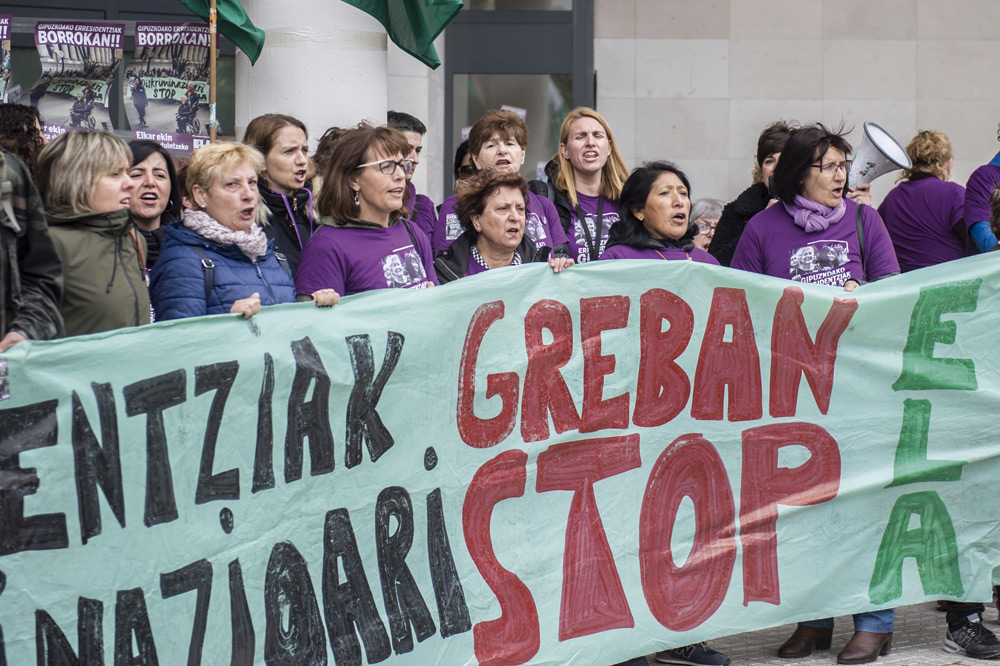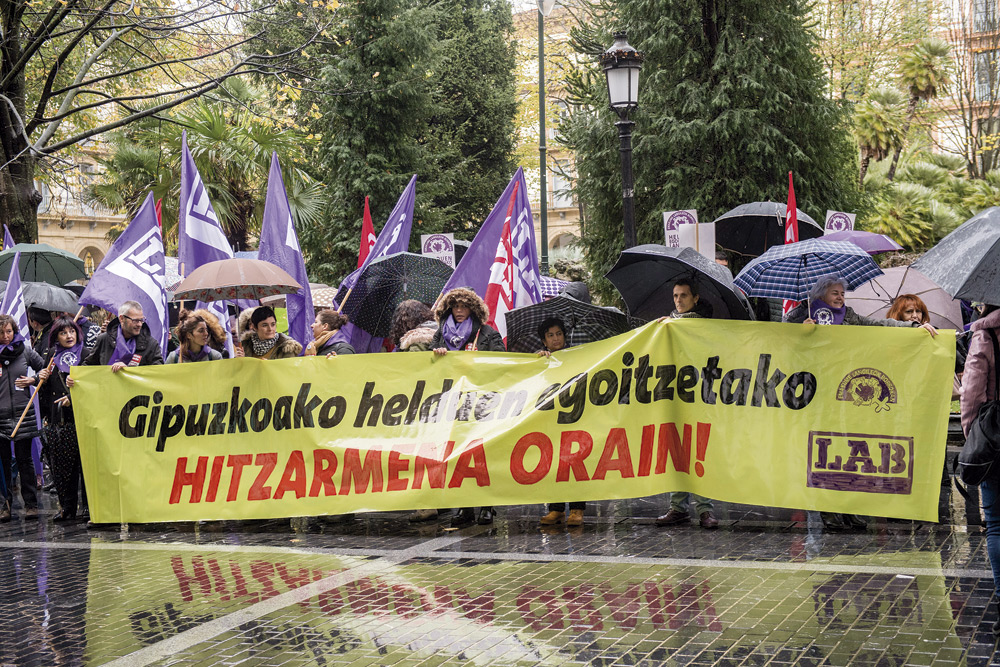Two years without agreement
- A total of 62 strike days have been held since they began in September 2018. They are managers, nurses and cleaners who work in residences and day centres in Gipuzkoa. The sector employs 5,000 people, most of them women. They call for the wage gap to be bridged. Compared to road cleaning workers, they charge 30% less per year, i.e. EUR 6,000 less.

The workers in the residences of Gipuzkoa resemble the long strike that began in March 2016 in Bizkaia and ended at the end of 2017. Workers from the same sector took to the streets in Bizkaia and if we begin to analyse the conflict in depth, the same characteristics will appear.
Almost all workers are women and because they are women they work in precarious conditions, from wages to physical and psychological exhaustion. In the residences and day centers they take care of the elderly, people with great dependency. So far (and even today), care tasks have been considered as the responsibility of women and have been carried out free of charge. Care work has gradually been paid, but women have continued to do the same work. Works without prestige, invisible and poorly paid.
The ELA union, with a 60% representation in the conflict in Gipuzkoa, has carried out an exercise of contrast with the objective of making the society visible, in a practical way, the employment differences between men and women. The union has shown a wage gap in which the wages of the road cleaning sector are compared with those of the residences. With a similar level of education and with the same number of hours of work, the barrels charge 6,000 euros more per year than the women. Idoia Elustondo, head of the headquarters of the ELA trade union in Gipuzkoa, has given us this example of a wage gap and has proposed a question for reflection: “My question is what is most important, to clean the streets or to care for dependents.”
By 2029 almost one third of the population of the Basque Autonomous Community (596,000 people) will be over 65 years old. The feminist movement has claimed, especially in the last two years, that care should be at the center of our lives and for this we must change the social model. Regardless of whether the feminist movement is heeded or not, care will be important, since at least the population is aging.
Another thing is how custody is managed. The residential sector of Gipuzkoa is managed in a similar way to Bizkaia. The care of the elderly is the responsibility of the Provincial Council. The public entity has subcontracted 90% of the service. Adegi, Matia 2020, Lares and Gara are the headquarters that are being managed. The workers know very well what privatisation means. The usurbildarra Aitziber Aranberri is a worker of the residence Villa Sacramento de Donostia-San Sebastián and a trade union delegate of ELA in the Gipuzkoan capital. At the conference organized by Argia on the conflict in residences, he said recently: “In twelve years I’ve met three companies, they sell us, and every change comes the cutbacks. We offer a public service, but they are being managed by private companies and the company seeks an economic benefit. Our feeling is that the Member does not monitor the management. The days of strike yes, so what matters to them is the well-being of the residents, but when we're not on strike, what? We don’t arrive, we have few people to serve everyone well, and then does the Council care nothing?”
Workers in general have a sense of abandonment and denounce that in times of conflict public institutions have repeated the same motto: That the company and the workers have to solve the problems, that the Member has nothing to do with that. The main leaps of the current care model can be summarized as follows: the benefits are for outsourced companies, the Foral Council escapes its responsibilities and the losers are the caregivers and the caregivers.
Aitziber Aranberri strike: "On strike days yes, the Council cares about the well-being of the residents, but when we are not on strike, what? We are not there, we are few people to serve them well, and then does the Council care nothing?”
Two years later, I couldn't release the knot.
The ELA trade union has a 60% representation in the conflict and LAB has a 20% representation. Everyone is making the protests on their own. At the negotiating table there are LAB, UGT and CCOO. ELA leaves the table arguing that there is no progress. The next date for the negotiating table meeting is 12 July.
The relationship of the majority union with the Provincial Council of Gipuzkoa is in the worst situation in which it has been immersed in the last two years. The union has described as "unprecedented aggression" what happened at the end of 2018 in the Gipuzkoan locality. ELA announced in March 2018 the start of the workers’ strike in September. By then, the trade union had already left the negotiating table and said that it had the approval of the Member to try a principle of agreement with the employers. ELA says that the pre-agreement with Adegi and Matia 2020, both employers and formed by Gara and Larés, was reached in December 2018 and it was reported to the Provincial Council. According to the union, the Council refused to finance what had been agreed in the pre-agreement. It has denounced that the Member denied that there was a principle of agreement, which was a unilateral proposal by ELA. Idoia Elustondo states that this is an unprecedented attack: “One thing is to say that you are not going to finance the agreement, but the most serious thing for us is to lie, to say that we have not signed any prior agreement. They falsified the document. They've presented ALS as a liar to society. The PNV has touched our tooth. In the conflict in Bizkaia they felt bittersweet and do not want Gipuzkoa to have such a victory. Maite Peña [Member of Social Policy] told us that this will not be Bizkaia II.”
In 2017 the renewal of the agreement was adapted and after two years there is nothing. LAB, CCOO and UGT are on the negotiating table with a representation of 40%. The only trade union that is being mobilized is LAB. A trade union with 60 percent, ELA, is out of the negotiating table. ELA strikers have been on strike for 62 days since September, the last from 26 April to 10 May. In order to tighten the screws and make the situation known to society, a campaign has been carried out throughout Gipuzkoa from 2 to 10 May. By county, in the most important villages, leaflets have been distributed denouncing the precariousness of women and the attitude of the Provincial Council. 280,000 leaflets have been distributed. On May 6, 700 ELA militants from Hego Euskal Herria met in Donostia to deposit leaflets in the mailboxes and place them in the car crystals.
During the strike, workers had minimum services of 70% (at times of lower workload) and 80% (at hours of higher workload). At the start of the strike, between 60% and 70% of workers were employed, but the Council has managed to raise the minimum. The workers report that days on which there is no strike are behaving seriously, thus creating even more serious problems for the care of the residents. The Aitziber Aranberri strike says the following about the rhythm of days that do not strike: “Physical and psychological work is very hard. We went out as tired as the laborers of the work. Also psychologically, we work with people, each has their needs and lack of personnel. Our most commonly used phrase is ‘a little wait, now I can’t’. We didn't get to everything. Time is completely marked. Now they squeeze everything.”
.jpg)
Residents' relatives are protecting workers
The residents' family members are aware of the seriousness of the situation in which the workers are, who cannot attend to all users. A group of relatives appeared on 4 May before the Social Policy Department of Gipuzkoa to show their concern and anger at the situation of these prisoners. Family members have denounced that workers are in a situation where they cannot access to properly care for their residents and have excessive workloads. The demonstrators have declared that the situation has been aggravated by the strike. They have transferred the Member who is the same who holds the key to the conflict between the workers and the employers, and they have denounced that the pre-agreement has not come forward because the Member did not want it. Mrs Maite Peña has been asked why she does not want to finance the start-up agreement signed by the ELA trade union and the two employers. On the other hand, they have announced that they are studying ways to recover the money they place to serve the residents of the residence. Although the services during the strike have been worse, the Provincial Council of Gipuzkoa has denounced the payment to companies of the usual amount. The family members, for their part, have paid the same thing despite the days of strike that have taken place. The money that the workers do not receive for the strike is taken out by the companies.
Strikers do not always have the support of users, and the conflict between the CAPV Social Initiative Centers is an example of this. Parents have not supported teachers, the goal of parents has been to denounce the situation of their children. On the other hand, during the long strike in the nursing homes of Bizkaia, the group of relatives of the Prostégete residents was created. They joined the demands of the workers and participated jointly in the protests that took place. Surveillance was transferred to the center of the conflict and for caregivers to feel well, the need to care for caregivers was insisted on.
Petitions by strikers
The starting agreement was agreed at the end of 2018 between ELA (60% of the representation) and most employers (Adegi and Matia 2020), outside the negotiating table. The improvements that would affect the entire Gipuzkoan sector under the pre-agreement are as follows:
1. Conclusion of agreements in both areas: On the one hand, the signing of the Gipuzkoa sectoral agreement and, on the other, the maintenance of the business agreements that the ELA union has signed at different locations.
2nd The agreement should be valid between 2017 and 2020.
3. Let the wage increase be the consumer price index plus 8%, for application in four years.
4. Increase of 42 euros per age by 2021.
5. Sundays and public holidays: EUR 45 increase for 2021.
6. Three days within the day for particular matters. Available by 2021.
7. 20 minutes of paid rest by 2020.
8. Six years of leave until the child is 10 years old and five years old if the worker is dependent on a dependant.
9. Reduction of working hours up to 15 years.
10. Full-time jobs and indefinite contracts.
For ELA, the preagreement had the approval of the Provincial Council of Gipuzkoa to later sign an agreement with the employers. The Provincial Council of Bizkaia rejected the existence of a pre-agreement and the employers, Adegi and Matia 2020, reported that it has not signed any agreements. ELA responded by saying that there are no documents signed, but that there is a text that expresses the agreement of the employers and that there is evidence of it.

40% trade union representation at the negotiating table
20% of the representation is in the hands of LAB, which together with CCOO and UGT have chosen to remain at the negotiating table, in front of ALS. Ane Sarriegi, head of the LAB headquarters in Gipuzkoa, says they do not understand or accept the position of ELA. Although employers are not prepared to accept what they offered at the table (proposes freezing wages), Sarriegi said that getting out of the table makes no sense. ELA and part of the employer (Adegi and Matia 2020) have continued to negotiate outside of the mesa.Este fact is one of the reasons why the fight in residences is not done with ALS, and the other is content. LAB prioritizes the sectoral agreement of Gipuzkoa and ELA does not want to bring into play the concrete agreements it has achieved in the residences. Following specific demands, LAB prioritises raising ratios; Ane Sarriegi stressed that more workers would take care of their health and that residents would be better atendidos.Sarriegi has indicated that the Provincial Council of Gipuzkoa is primarily responsible for the conflict, as “the service is public, the funding is public and the sector is in private hands. The Deputation has to resolve the conflict.”

























